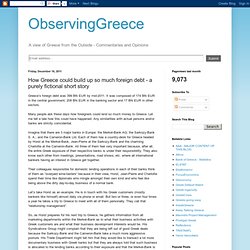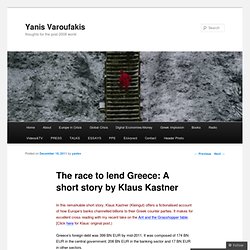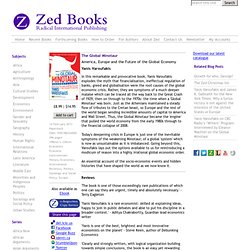

Ending 2011 with a fable for our times. As 2011 is drawing to a close, with the ECB only having managed to paper over the deepening cracks of the eurozone, it is time to allow ourselves to abandon the barricades for ten days or so.

If the soldiers in the Great War’s killing fields could maintain a humane ceasefire, tend to the wounded, and bury their dead, we too can afford to put a cap for a while on our hectic rythm. Anyhow, the Crisis will be back with hideous vengeance soon after the New Year. So, time to switch off our gadgets, look after those whom we have neglected, and reflect on a truly awful year. For my part, I am flying soon to Sydney to be with my daughter. I wish you all a happy holiday and a New Year worthy of the many good people who suffered needlessly during 2011. Lastly, since 2011 was the year of ‘my’ Minotaur, I leave you with this fable (which sums up in few words my book’s gist): Alas, the beast’s appetite could only be satiated by human flesh. The Cretan Minotaur was slain by a brave Athenian Prince. How Greece could build up so much foreign debt - a purely fictional short story.
Greece’s foreign debt was 399 BN EUR by mid-2011.

It was composed of 174 BN EUR in the central government; 208 BN EUR in the banking sector and 17 BN EUR in other sectors. Many people ask these days how foreigners could lend so much money to Greece. Let me tell a tale how this could have happened. Any similarities with actual persons and/or banks are strictly coincidental.
Imagine that there are 3 major banks in Europe: the Merkel-Bank AG; the Sarkozy-Bank S. Their colleagues responsible for domestic lending operations in each of their banks think of them as “overpaid wine-tasters” because in their view, Horst, Jean-Pierre and Charlotte spend their time like diplomats who mingle amongst their own kind and who feel like being above the dirty day-to-day business of a normal bank. Let’s take Horst as an example. Horst also requests input from his Risk Management Department. On the plane to Athens, Horst starts flipping through the reports of his Risk Management Department.
The race to lend Greece: A short story by Klaus Kastner. In this remarkable short story, Klaus Kastner (Kleingut) offers a fictionalised account of how Europe’s banks channelled billions to their Greek counter parties.

It makes for excellent cross reading with my recent take on the Ant and the Grasshopper fable. [Click here for Klaus’ original post.) Greece’s foreign debt was 399 BN EUR by mid-2011. It was composed of 174 BN EUR in the central government; 208 BN EUR in the banking sector and 17 BN EUR in other sectors. Many people ask these days how foreigners could lend so much money to Greece. Imagine that there are 3 major banks in Europe: the Merkel-Bank AG; the Sarkozy-Bank S. Their colleagues responsible for domestic lending operations in each of their banks think of them “overpaid wine-tasters” because in their view, Horst, Jean-Pierre and Charlotte spend their time like diplomats who mingle amongst their own kind and who feel like being above the dirty day-to-day business of a normal bank.
Let’s take Horst as an example. Yanis Varoufakis. The Global Minotaur: America, The True Origins of the Financial Crisis and the Future of the World Economy (Economic Controversies) (9781780320144): Yanis Varoufakis. The Global Minotaur. In this remarkable and provocative book, Yanis Varoufakis explodes the myth that financialisation, ineffectual regulation of banks, greed and globalisation were the root causes of the global economic crisis.

Rather, they are symptoms of a much deeper malaise which can be traced all the way back to the Great Crash of 1929, then on through to the 1970s: the time when a 'Global Minotaur' was born. Just as the Athenians maintained a steady flow of tributes to the Cretan beast, so Europe and the rest of the world began sending incredible amounts of capital to America and Wall Street. Thus, the Global Minotaur became the 'engine' that pulled the world economy from the early 1980s through to the financial collapse of 2008. Today's deepening crisis in Europe is just one of the inevitable symptoms of the weakening Minotaur; of a global 'system' which is now as unsustainable as it is imbalanced. Reviews 'If you want to know how serious the current crisis is, you should read his book.